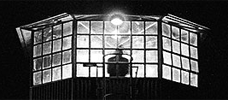Reviews
A Londoni férfi
Béla Tarr
France / Germany / Hungary, 2007
Credits
Review by Rumsey Taylor
Posted on 21 October 2007
Source Fortissimo 35mm print
Related articles
Reviews Sátántangó
Reviews Werckmeister Harmonies
Categories The 45th New York Film Festival
The final shot of The Man from London consists only of a woman’s face for several minutes before a fade to white. You’re compelled to study this face as you would a landscape, as you are other surfaces in the film: the bow of a ship looming enormous in the composition, or the back of a woolen jacket, its wearer’s shoulders collapsed wearily in an arc. Each of these images is scrutinized under the eye of Béla Tarr—his films subsist on such images, and they achieve a sort of mystic, plaintive significance.
For much of his career Tarr’s films have concerned depraved, inaccessible environments wrought with poverty, greed, and alcoholism. They are by this measure quintessentially foreign films, told in operatic long-takes that render these environments oppressive, making them places that would be impossible to exit without a great amount of labor. These are each engaged by conflicts in which an outside element is introduced, and this element repercussively violates an insular social order. These tendencies are manifested in The Man from London, which bears Tarr’s aesthetic and tonal signatures pronouncedly—some of which are even lifted verbatim from his prior films. But there is an anomalous element at play, as well, one that resists the esotericism and nuance of Tarr’s previous work. To wit, in lieu of images of mammoth, biblical import, we have here a suitcase full of money.
Greed is predominant in Tarr’s formidable masterpiece, Sátántangó, and the same is the case here: the suitcase is the impetus behind a murder, one witnessed by Maloin, a night watchman at a train station in an unspecified port city (presumably one in France adjacent to the English Channel). The murderer flees his crime, and afterward Maloin leaves his post to collect the evidence. The body is soon found, and Maloin’s greed begins to overwhelm him. In an environment of such quiet hostility, one would think greed to be mutable within an array of impetuous social ills. And yet greed is here the greatest within a choir of sins because it is a contaminative element, manipulating men instead of merely compromising their ethics.
The Man from London is less concerned with the existential conflicts that characterize Tarr’s earlier collaborations with László Krasznahorkai, in which specific incidents afflict entire townships. The money here is an obvious MacGuffin, relevant only insofar as it elicits greed in the few men who know about it, and it is curiously emphasized: upon studying the suitcase’s contents at length, Maloin proceeds to dry the money by laying it patiently, bill by bill, upon the grated chimney of a coal oven—this being one of the true blessings of wealth, to be able to play with your money before it’s spent and gone. But such a blessing will remain internalized and superficial. Maloin keeps his wealth a secret from his wife, and extends it only to purchase his daughter a fur coat in a rather erroneously comedic instance. This, and other actions in the film are plot gestures, amounting, narratively, to little more than a simple parable about greed. The same supplies the entire conflict in Sátántangó on a much richer scale.
Our perception of the onscreen events is always clear—this film is propelled by an air of intrigue more than it is by suspense or mystery. It may seem a misconception to delineate the failed subscription to genre in this case, but the film also doesn’t subscribe compassionately to Tarr’s prior narrative exercises. Rather, it’s torn between both, a film noir that makes little attempt to manipulate perception - a mystery in which the viewer is not made complicit - and a Béla Tarr film concerning a community that is far less depraved and opportunistic than his others. The Man from London, however comprehensible and demystified, is housed in a world of nonetheless pure, enveloping ambiance—and it is by this measure that its merits are clearest.
More The 45th New York Film Festival
-

The Darjeeling Limited
2007 -

Hamlet
1921 -

The Romance of Astrea and Celadon
2007 -

Secret Sunshine
2007 -

Paranoid Park
2007 -

Alexandra
2007 -

Before the Devil Knows You’re Dead
2007 -

The Diving Bell and the Butterfly
2007 -

The Last Mistress
2007 -

The Man from London
2007 -

I’m Not There
2007
We don’t do comments anymore, but you may contact us here or find us on Twitter or Facebook.



